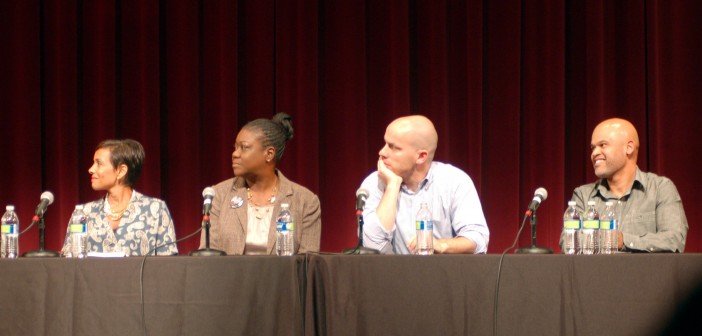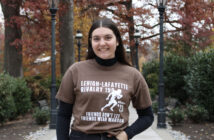“Nothing my son did should have caused his death,” Sybrina Fulton said.
The auditorium echoed with applause as the mother of Trayvon Martin spoke about her tragedy.
“That’s my child. Just like your child,” Fulton said. “He doesn’t have to be perfect. He has a right to be alive.”
***
Rap Sessions and the Trayvon Martin Foundation hosted a panel discussion in Baker Hall on Tuesday night, bringing together a group of leading thinkers to share their experiences and talk about the misguided perception of black men in American society.
The panel, which began at 7 p.m. and was entitled “America’s Most Wanted: Hip-hop, the media & the criminalization of black and brown youth,” was moderated by hip-hop artist and activist Jasari X.
“Right away people start to think about the criminalization coming from white folks, and, all in all, this event is about changing the trajectory of the conversation,” said Tyrone Russell, director of the Office of Multicultural Affairs. “The conversation’s really about the youths who are criminalized, not necessarily the people doing it, but the fact these groups are criminalized.”
Focusing on the stories of Trayvon Martin and Michael Brown as a jumping off point, another main theme in the discussion was the role of America’s youth — of all races — in the betterment of society.
“This has to be a cross-racial movement,” said Bakari Kitwana, executive director of Rap Sessions and the host of the event.
Michael Skolnik, political director for Russell Simmons and editor-in-chief of Globalgrind.com, was the only white male on the panel and discussed his social responsibility to be active in this movement.
“We (white people) take many of these rights for granted,” Skolnik said. “And the right to live for granted. It’s our duty in life, and if we don’t do it our life, in my opinion, is somewhat worthless, to fight for those same rights for every person in this country and in this world.”
Along with Fulton and Skolnik, the panelists included Carlito Rodriguez, writer and producer of BET documentary “50 Shots on Police Brutality and Sean Bell,” and Niaz Kazravi, National Director of Criminal Justice for the NAACP.
All participants agreed that media is a fundamental tool in helping to revolutionize public thought.
“I’m very into media. I think it’s very powerful,” Rodriguez said.
Rodriguez specifically touched on social media, and how it can be used to rally people, get a topic trending and ignite a fire that will lead to action.
While the potential to use media for good is there, it’s a double-edged sword.
Fulton spoke about how she fell victim to the media.
“I was at fault myself cause I said, ‘Well, maybe it was the hoodie. Maybe it was the hoodie, and that’s the reason why he was shot and killed,’ but as I traveled and I go to airports and different cities and different communities – everybody wears the hoodie,” Fulton said.
She said this is a “pretty lie.”
“The ugly truth was he was murdered because of the color of his skin,” Fulton said.
The audience had powerful thoughts to share, as well.
“I think one of the most amazing parts of it was when Fulton discussed how far she thought they (society) had come after Trayvon’s death,” Sarah Giegerich, ’15, said. “After two years, she thought America had come so far, in terms of racial profiling and criminalization of black youth. Right after Michael Brown’s death, she realized she had gotten nowhere, and the world had gotten nowhere. It was right back to the beginning.”
Russell hopes that the Lehigh community will take away a new perspective as well as awareness from a conversation that many do not often engage in.
“I got Goosebumps from a couple of the lines that really made me think,” Brian Komlo, ’15, said. “Hearing about some of the inside opinions really surprised me. I felt incredibly included in the issue.”
The audience was aware of how monumental this event was.
Sidney Ro, ’17, said she felt “privileged” to be a part of this discussion.
“We live in a place where we try and remove ourselves from these kind of situations,” Ro said. “It doesn’t affect us. It doesn’t affect my family or people I know. But having her (Fulton) here kind of brings the issue to the forefront.”






Comment policy
Comments posted to The Brown and White website are reviewed by a moderator before being approved. Incendiary speech or harassing language, including comments targeted at individuals, may be deemed unacceptable and not published. Spam and other soliciting will also be declined.
The Brown and White also reserves the right to not publish entirely anonymous comments.